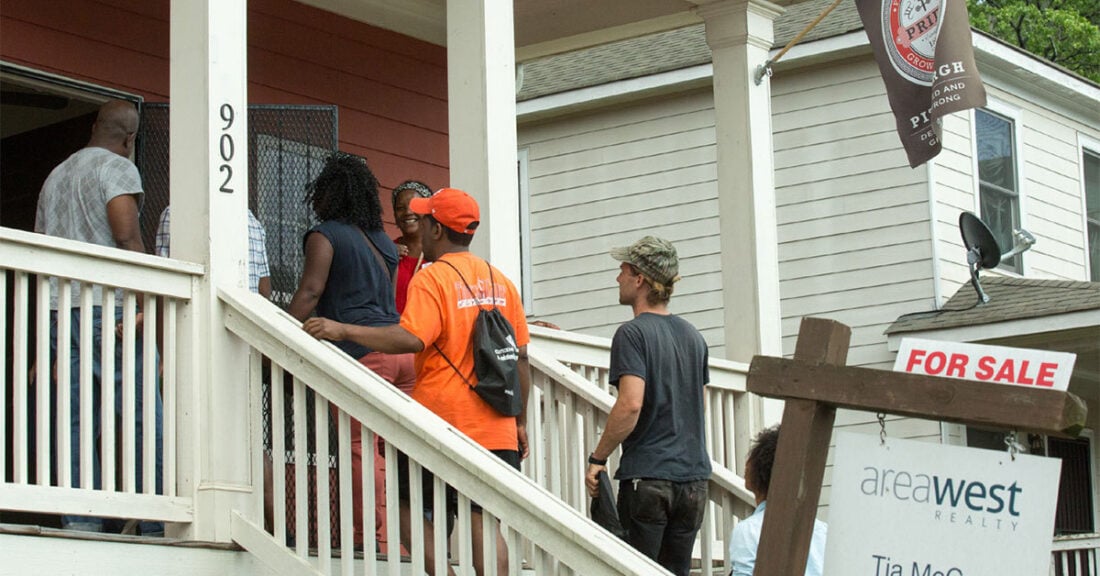Lessons on Post-Recession Community Development in Southwest Atlanta

An estimated 95% of the 10,000 new apartments built in Atlanta between 2013–2016 are considered “luxury” — with annual rent for a one-bedroom unit averaging $20,736. Yet in Pittsburgh, a historically African American neighborhood hard hit by the 2008 foreclosure crisis, the average annual income is just $22,819.
A new report from the Annie E. Casey Foundation, Affordable Housing in Pittsburgh, highlights its efforts over the last 11 years to address this disparity. It offers lessons and recommendations that mission-driven funders, policymakers, investors and developers can take to create more economically inclusive communities and combat the tide of displacement that threatens Pittsburgh and many other neighborhoods of color throughout the nation.
“As our nation continues to reckon with deeply rooted racial injustices, including those we’re seeing surrounding the coronavirus pandemic, it is crucial that we push ahead with the fight to create and protect affordable housing options for black and brown families,” says Kweku Forstall, director of the Casey Foundation’s Atlanta Civic Site.
Recognizing that safe, stable housing is necessary for communities to thrive, the Casey Foundation launched a multipronged approach in 2009 to help revitalize Pittsburgh, largely focused on renovating 53 homes throughout the neighborhood. To date, 43 properties have been redeveloped and rented or sold at accessible prices and local nonprofits will oversee a similar transformation for the remaining 10 properties.
Collaboration has been vital to the project’s success.
“For those stepping into the community development and affordable housing space, finding the right partners who share your values is critical,” says Natallie Keiser, a senior associate at the Foundation who oversees Casey’s neighborhood revitalization work in Atlanta.
Casey and its partners have used a mix of tools — including community land trusts, land banking, creative financing sources and down-payment assistance programs — to reduce vacancies, increase homeownership and create a variety of affordable housing options.
The approach has also sought to support community leadership, engagement, safety and beautification to strengthen Pittsburgh’s public image and encourage home sales among a diverse group of buyers. The Foundation funded community cleanups and façade improvements for local businesses, partnered with city officials for greater code enforcement of vacant properties and provided grants to local nonprofits to help owners with low incomes throughout Pittsburgh make home repairs.
Beyond highlighting opportunities and challenges that have arisen since the redevelopment efforts began, the report offers key lessons and policy recommendations to expand access to safe, long-term affordable housing options. This advice includes:
- complementing physical redevelopment activities with broader efforts to strengthen neighborhoods — such as community cleanups, public art installations, greater code enforcement and safety measures — that are developed and led by residents and community-based organizations;
- seeking like-minded developers, real estate agents and other partners who are willing to use multiple funding sources to bridge the gap between the cost of acquisition and development and what lower-income buyers and tenants are able to pay;
- concentrating redevelopment activities on one street or cluster of blocks to more quickly spur optimism and attract buyers;
- cultivating trusting relationships with community members and hire them to oversee active construction sites and report trespassing when workers are not present;
- protecting laws, such as the Community Reinvestment Act, that ensure equal lending opportunities for low- and moderate-income buyers — especially those of color — and others that require homebuyer education and the provision of public down-payment assistance; and
- acquiring properties that are ripe for combined and higher-density usage.
“We hope the lessons and recommendations shared in this report can help not only community development partners and policymakers in Atlanta but also others throughout the United States who are committed to affordability,” says Forstall.





